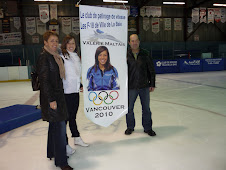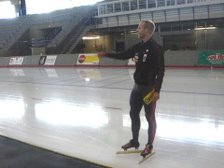On thin ice
Selena Hinds - Winnipeg Free Press - Auguste 31th 2008
It'll be no walk in the park for Canada to 'own the podium' in Vancouver
This story is an extract from Selena Hinds' thesis toward her Masters degree in journalism from Carleton University. DR. Peter Davis has advised Olympic organizations in more than 20 countries and has a reputation for delivering results. He overhauled the system in his homeland, Australia, and watched his countrymen dominate the Games in Sydney in 2000. Now he's been hired to do for Canada, at Vancouver in 2010, what he did for Australia. And he is not sure he'll succeed. [...] "Things are getting better every day, but whether they'll get better in time for 2010 Olympics, I struggle to see that. We'll certainly do better, but whether we'll hit the target? I don't know."
[...] The Canadian Olympic Committee put together a group of international sport experts led by Cathy Priestner Allinger, 1976 Olympic speed skating silver medallist turned sport administrator. Eight months later, it produced Own The Podium. Dr. Roger Jackson, a three-time Canadian Olympian, became CEO and lured Davis from Australia to drive the sport science, medicine and technology arm. [...]
The centre of Canada's efforts is Canada Olympic Park in northwest Calgary, where Jackson works. He's employed a team of enthusiastic high- performance advisers to keep watch over all the sports. Daniel Lefebvre, for example, left his coaching job at Biathlon Canada to manage OTP's relationships with alpine and freestyle skiing, short and long track speed skating, and hockey.
[...] As an outsider looking in, Lefebvre says he is able to see where sports require improvement and offers solutions. He is at the heart of a new sport culture that's pushing sport organizations, coaches and athletes to produce better results.
"I say let's not look at what you're doing good, let's look at what you can do better," Lefebvre said. "Speed skating's shooting for 15 medals. Great! How do we get to 20?"
[...] But beneath the fanfare, there are rumblings of concern and discontent. Critics say there are flaws in OTP's design and its execution has been far from problem free. [...]
Dr. Cal Botterill, one of Canada's top sports psychologists
"For me, the first mistake OTP made was making the projections unilaterally, without the input from athletes. If you run a company, if you're smart, you do your goal setting with your employees," Botterill said. "You don't come in here and say, here's what we're going to do - do this, do that. I think the athletes would have set pretty ambitious goals."[...] Botterill also thinks OTP has too many athletes listed as medal prospects. He warns there are real risks to dubbing athletes medal contenders before they are ready. As soon as success becomes "have to", rather than "want to", athletes are prone to fear failure.
"When you put people up as favourites before they are ready, it's often problematic because they haven't learned to be favourites. Wayne Gretzky, Tiger Woods, have learned to be a favourites," Botterill said. "If we put all of our young amateur athletes in the same circumstances without the experience of being a favourite and learning to do that, we're doing a disservice to them."
In its early days, Own the Podium staff estimated Canada would need to win 35 medals to become the top medal winning country in Vancouver. In 2007, the Canadian Olympic Committee backed off on the target, suggesting the goal was simply to finish first in overall medal count, not to achieve a specific medal count. But the initial breakdown is indicative of where expectations lie:
Predicted medals
Tier One "must win"
Long track speed skating 8
Short track speed skating 7
Ice hockey 2
Curling 2
Figure skating 3
Tier Two "high priority"
Alpine skiing 3
Freestyle skiing 3
Snowboarding 2
Cross-country skiing 1
Tier Three "targeted athletes"
Biathlon 1
Bobsleigh 1
Skeleton 1
Luge 1
Ski jumping 0
Nordic combined 0
TOTAL 35
Source: Own the Podium 2010 -- Final Report. Sept. 2004














































Aucun commentaire:
Publier un commentaire